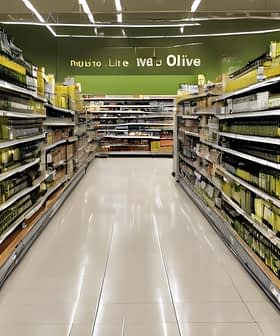Olive Oil Production to Fall 25%, European Commission Predicts
All of Europe’s main producing countries, with the exception of Greece, are expecting significant production drops. However, some believe the forecast is too pessimistic.
Olive oil production in the European Union is expected to fall to 1.7 million tons in the 2022/23 crop year, according to estimates published in the bloc’s short-term agricultural outlook report.
This year’s olive oil yield represents a 25 percent drop compared to last year and is 20 percent below the rolling five-year average.
The E.U. projections about the drop in European olive oil production seem way too negative when compared to our estimates.
In Spain and Italy, production is expected to fall by 30 percent. In Portugal, officials noted that the irrigated super-high-density olive groves of Alentejo were less affected by the Iberian Peninsula’s ongoing drought. Nevertheless, production in the country is expected to fall 40 percent compared to last year.
According to the E.U. projections, olive oil volumes will fall in all producing countries, with the notable exception of Greece.
See Also:2022 Harvest Updates“The drought that enveloped significant areas in Portugal, Spain, France, Italy and portions of North Africa since last winter did not harm the main Greek production areas,” Vasilios Frantzolas, an olive oil taster and quality consultant, told Olive Oil Times.
He added that Greece experienced similar problems with drought and wildfires in the 2021/22 crop year.
“In August this year, instead, we had generally moderate temperatures,” Frantzolas said. “Only in a few areas, some higher temperatures might have impacted production by damaging the flowering.”
“The olive oil yield in Greece is considered abundant when it reaches 300,000 tons,” he added. “Talking with olive growers and millers in several areas, the estimate for the current season is between 270,000 and 285,000 tons of olive oil, with an estimated 100,000 coming from Crete, which produced approximately 60,000 tons last year.”
Away from Greece, southern and western Europe faced one of the hottest summers on record, accompanied by heatwaves and arid weather, which stunted the development of the olive trees at critical moments.
The combined drought indicator of the E.U. Joint Research Center reported that 33 percent of Europe faced a soil moisture deficit in September. Meanwhile, 26 percent of the continent is in a state of alert due to crops and vegetation showing severe signs of stress.
The center emphasized how the extraordinary summer conditions pushed many national and regional authorities to restrict water use for irrigation. “In some regions, very low reservoirs levels made field irrigation impossible,” E.U. officials wrote.
Along with olive development, these severe conditions also impacted staple summer crops, such as grain maize, soybeans and sunflowers.
The main olive oil-producing countries in the European Union are also some of the continent’s largest olive oil consumers. According to the report, lower levels of olive oil production will likely be supplemented by increased imports.
Additionally, lower production is among the factors fueling rising olive oil prices and may result in a decrease in demand in some price-sensitive foreign markets. E.U. officials said exports could fall by 10 percent.
The officials added that 625,000 tons of ending stocks from previous harvests might not be enough to relieve pressure on prices at the origin.
However, Frantzolas said demand for olive oil and, therefore, prices also would depend on other edible oil prices.
“If those prices go down, that will trim the rise in olive oil prices,” Frantzolas said, as some consumers would ditch olive oil for cheaper alternatives. As a result, he estimated that E.U. olive oil consumption could fall by up to 6 percent.
Frantzolas added that developments from the war in Ukraine would determine other edible oil prices. “Seed oil prices could go down as Russia seems to have allowed Ukrainian shipments to leave the country,” he said.
E.U. agricultural officials agreed that increasing pressure on consumer budgets caused by inflation might force Europeans to limit their olive oil consumption, which they said could decline by up to 9 percent.
However, not everyone agrees with the analysis of the E.U. agricultural outlook report, with some saying it seemed a bit too pessimistic.
“The E.U. projections about the drop in European olive oil production seem way too negative when compared to our estimates,” Anna Cane, president of the Italian Association of the Edible Oil Industry’s (Assitol) olive oil group, told Olive Oil Times.
She acknowledged that many producing countries have entered an ‘off year’ in the natural alternate bearing cycle of the olive tree “and the sector had to cope with months of extreme climate, such as the hot weather since May and the floods of August.”
“Recovering from the damages caused by the hot summer will not be easy, but we do not believe that a 25 percent drop estimate is justified,” she added. Instead, Assitol expects Italian olive oil production to reach 250,000 tons, 20 percent below last year’s yield as opposed to the 30 percent estimated by the E.U.
Away from production, both Frantzolas and Cane warned that the rising costs of glass and other packaging materials would further complicate the harvest.








